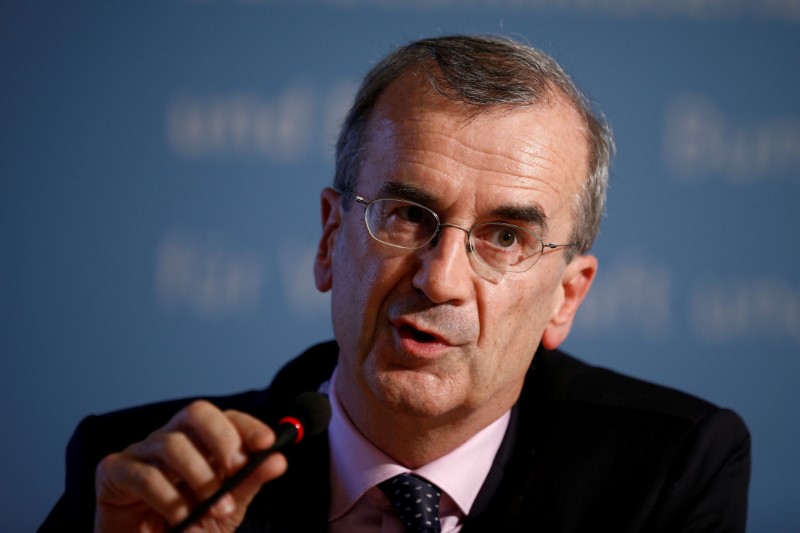By Leigh Thomas
PARIS (Reuters) - International bank regulators need to wrap up talks on minimum capital requirements and any rowing back on existing rules by the United States would have "grave consequences", ECB Governing Council member Francois Villeroy de Galhau said on Friday.
"For banks, the priority is to stabilise the regulatory framework. We thus must finalise Basel III," Villeroy said in reference to the talks by international bank supervisors.
Basel III, written by the global Basel Committee, tightens capital requirements after the 2007-09 financial crisis. The bulk of the rules are being implemented, but final elements are gridlocked.
A two-day Basel Committee meeting ended on Thursday without a statement.
The discussions have stumbled over a proposed "floor" which would mean capital cannot fall below 75 percent of the "standard" approach set out by regulators and used by most lenders, while big banks use models to add up risks instead.
Speaking as the head of the French financial sector regulator, Villeroy told a conference in Paris that an output floor at that level was unacceptable and a deal was needed at a lower level but with more strict supervision of banks' internal models.
"I read or hear negotiating advice from the banking industry and from French banks in particular. A bit of control would not hurt, and our aim is not to defend sector interests," Villeroy said.
"If an output floor at 75 percent is unacceptable, it’s because this threshold and therefore the standard model would become the constraint for half of international banks," he said.
Germany, the Netherlands and the European Union's executive European Commission held the same view, he said.
UNILATERAL USA
The U.S. Treasury published a review of regulation on Monday which recommended delaying two core Basel III rules already agreed.
Villeroy said the review could call into question the two rules just as the EU begins a process for implementing them.
"A unilateral deregulation would only be a lose-lose game with grave consequences both for the stability of the global financial system and for competition between American and European banks," Villeroy said.
When Europe comes to implementing an eventual deal on Basel III, it should pay particular attention to what's happening in the United States, Villeroy said.
International regulatory cooperation is a "shared asset" and vital for the future, he said.
"The temptation to row back is very dangerous. It would increase the probability that a new financial crisis erupts. In this regard, the situation in the United States is worrying."
In its review, the U.S. Treasury made a point of backing the proposed output floor because, it said, in some cases non-U.S. banks have significantly lower capital requirements.
U.S. lenders have complained that European rivals are allowed to hold less capital.

A banking source said those comments from the Treasury may have soured the mood at this week's Basel meeting. "The Europeans don't want the United States to use Basel to punish them," the banker said.